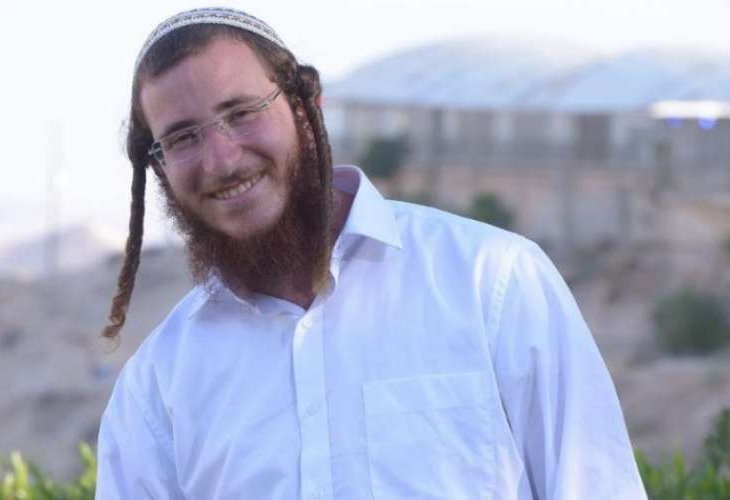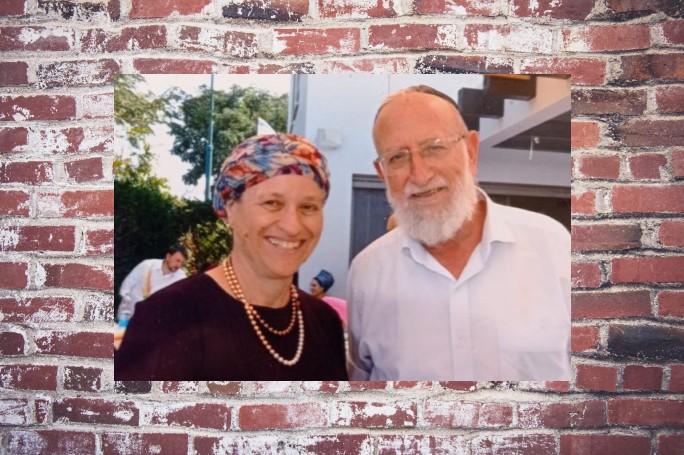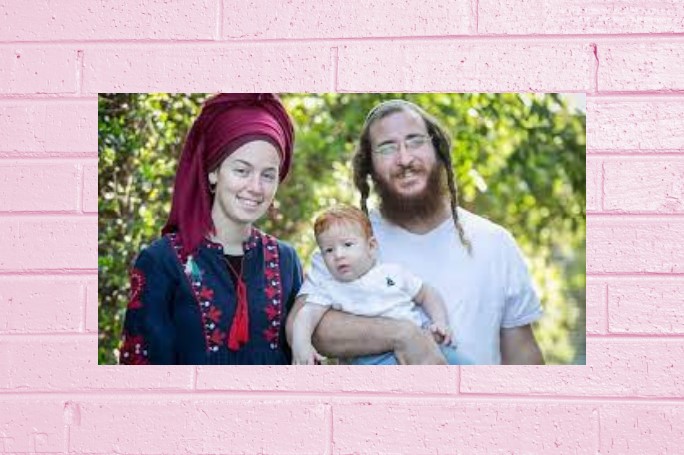The Family of Yehuda Dimentman, May His Memory Be a Blessing: "We Feel Betrayed by Our Government"
In an emotional interview, Yehuda Dimentman's family speaks about the special person he was and why he chose to study Torah on the ruins of Homesh. They also discuss the Israeli government's disheartening policies and the potential good that can emerge from this.
 Yehuda Dimentman, May His Memory Be a Blessing (Photo - Courtesy of the Family)
Yehuda Dimentman, May His Memory Be a Blessing (Photo - Courtesy of the Family)"When I saw the spikes at the entrance to Homesh, I felt a stab directly in my heart," said Yehuda Dimentman's father a few days ago. It was during his visit to the yeshiva situated amidst the ruins of the destroyed settlement, where vehicle access had been restricted. Exactly a month ago, Yehuda was murdered on that same road, returning from the yeshiva to his home in the settlement of Shavei Shomron. He and his friends were fired upon by terrorists while driving. A week later, thousands ascended to the ruins, demanding the renewal of the settlement, but the Israeli government chose to destroy the buildings there immediately afterward. Yehuda's widow, Atya, expressed her profound pain over the government's policy in a letter to the Prime Minister, writing, "It felt like a bullet to the heart, such betrayal."
However, in a personal conversation with Rabbi Mordechai and Miriam Dimentman - Yehuda's parents, as well as with his widow Atya, it's not only pain that one hears, but also great faith - in the right path, with the certainty that Homesh will be rebuilt one day, and in the internal change they perceive within the consciousness of the people concerning this issue.
A Person of Passion and Joy
"Yehuda was our youngest, our 12th child," his parents begin. "He was a person full of life and joy, spreading vitality and light wherever he went. He had a lot of passion, enthusiasm, and great energy, alongside a unique boldness, apparent since childhood. We remember how once he returned from Torah study alone. We live in Mevaseret Zion, he studied in Jerusalem, and usually, his older sister would pick him up from school and travel home with him. But that day, he returned alone, a first-grader, deciding to travel by two buses on his own. He had the courage and determination to do it, feeling he had to try."

Along with his passion and joy, came a special connection to everyone. "Recently, one of his teachers told us he asked the students who last spoke with Yehuda, and several claimed their last conversation was with him. This was because Yehuda simply spoke with everyone, drawing them to Torah and sweeping them along. One of our grandchildren told us that during the family trip last Av, Yehuda fervently discussed the study of Mishnah with him and several other grandchildren. Yehuda himself had a structured Mishnah study routine, and this grandchild decided to start learning Seder Zeraim because of him. He completed this study exactly on the day of the murder. Since that poignant completion, he has, of course, continued to other Mishnaic texts. We also received numerous invitations to celebrate the completion of each Talmudic tractate Yehuda finished, sometimes held at the Homesh yeshiva and sometimes at his home. Yehuda would say that studying complex tractates, which require diligence and effort, is no less than completing an army course, and so it was important for him to celebrate each completion with great joy."
His wife, Atya, also shares about the effort she saw in his Torah studies. "About a year and a half ago, Yehuda started a regular study of two chapters of Mishnah and three and a half pages of Gemara daily. He was apprehensive about the commitment, and deciding to do it wasn't easy for him. But once Yehuda made up his mind, he did not compromise. He did not miss a single day of learning, even if we returned home late from a long journey, or if he had to leave in the middle of a family gathering. Sometimes we paid a price for it, but it was clear to us that this was the right thing. For instance, last summer when he went on a trip with his nephews, his brother told us he saw Yehuda sitting in the evening with his feet in the water, a flashlight in hand, and a Gemara on his lap. Yehuda loved hiking, but he always made sure not to compromise on Torah study."
Living with him, Atya says, was a great thing. "This week, I spoke with Yael Shevach, widow of Raziel Shevach, may his memory be a blessing, and I said to her that often after someone passes away, we realize how great they were. Sometimes there's a sense of missing out, that we didn't notice it while they were alive. But I knew I was living with a great person. He was a special husband, a good father, and had high ideals in his sight. I felt that we were moving forward towards significant action for the people of Israel."
His unique connection with everyone was evident even in his last week of life. "He had the privilege to teach a third-grade class at the Shavei Shomron school for the first time, and during recess, he went out to play with the kids," says Atya. "During the shiva, a mother of one of them told me her son said, 'No rabbi ever played tag with us before.' That was Yehuda, someone who knew how to connect with anyone at any age - from young children to teenagers, who would open their hearts to him, and people of all other ages. Anyone who spoke to him felt like the most important person in the world because Yehuda was genuinely interested in them and kept up with their situations afterward."
The Homesh Challenge
Where did the decision to study at the yeshiva in Homesh come from?
"Yehuda studied there two years before our marriage and later moved to Mercaz HaRav Yeshiva in Jerusalem. After our wedding, he debated whether to stay in the Jerusalem yeshiva and immerse himself entirely in Torah study or move to Homesh and face the challenging conditions there, which could sometimes interfere with learning. Ultimately, Yehuda decided that his Torah study would hold much greater significance, especially in such a challenging place, and that the home we would build would grow bigger through this effort. When a person contributes of themselves to something significant, they themselves benefit, and we felt this throughout his study period there."
Conditions in Homesh were never easy. "There was no cell signal, for instance, and from the moment Yehuda left for the yeshiva in the morning, I couldn't speak to him until the evening. Sometimes this was complicated when I wanted to inform him of something during the day, but on the other hand, I was glad to know he could study without interruptions from home. There were Shabbats and holidays we spent in Homesh, meaning sleeping in structures without water, electricity, or bathrooms. Yet, we were happy to be there, understanding that each of our small steps was advancing the place."

And what progress was made there over the years?
"Progress is slow, in small steps, but it exists. Initially, nobody was allowed to ascend to Homesh, and the students did so in secret. Later, open access to the place was allowed, and a yeshiva ran there throughout the weekdays. Eventually, we started spending Shabbat there, and slowly things were built up. Although everything is progressing at a very slow pace, it holds significance. We must remember that every small advancement on the front serves as protection for the home front because as long as the battle is there, the home front is protected. One can see just how fiercely the Arabs fight for this place because they understand that Jewish presence there holds great importance. So yes, there is a yeshiva standing without electricity and water, but it defends against harm in other Jewish-populated areas."
But still, isn't there a point in giving up sometimes and moving to other fronts?
"Many have asked us this question, questioning why take such risks," Yehuda's parents say, "and we ask - when Jews ascended to the land, was the situation like Switzerland? Even then, there were Arabs who wanted to kill, swamps needed draining, and countless other challenges. For us, the students of Homesh Yeshiva are the continuers of all those who ascended to the land, doing exactly the same, and we salute them for being willing to act despite the difficulties and dangers. It's an area under terrible Arab control, which, as it continues, poses a threat to the State of Israel. So, like a soldier who goes to battle believing in the righteousness of the way, while aware of the risks, Yehuda did it knowing it was the right thing. The problem is that our generation was taught that those willing to endure the mud and cold to build the land are the bad guys, but this has no connection to the truth."
Yehuda's parents see the negative view against settlement today as part of a process of discernment. "Rabbi Kook already said that first, people who were not observant of mitzvot would come to the land and participate in building, followed by a stage of faith, where deeper clarifications would arise regarding our existence here. People would start questioning what we are seeking here, why not make peace with the Arabs, and what's our connection to the Land of Israel. This is happening now, and one can hear strong voices opposing the path we are taking. However, for those connected to eternity, it is clear what will happen in the end, and they continue to act even in the face of an affront to true values. The people of Israel are not 120 years old, and our history did not start with the first or the second aliyah. We did not come to the land as conquerors, and no declaration from Balfour, nor from Biden today, will decide our connection to this land. We are a people that is 3,500 years old, and we have the Bible, which guides our way, and so we continue to build the land despite all the challenges we face. The reality itself echoes this - the mother of the terrorist who murdered Yehuda announced that she is proud of what her son did and hopes other mothers will encourage such acts. They would love for us to leave Homesh, and that's why every strengthening against them is important and prevents further harm to our lives here."
There's a lot of talk and activity for Homesh, but if the government currently chooses to act otherwise, why all the effort?
"One must understand that regardless of whether the government decides one way or another, this isn't the only change happening on the ground. There is an educational process working within the people's hearts, and the mere discussion and thought on the subject create change," continue Yehuda's parents. "We saw this very tangibly during the shiva. Different people came to speak with us, including leftist Knesset members, and we felt how the things we said touched their hearts. Their meeting with people like us, involved in education and action, creates change because when you see reality up close, it looks different. Additionally, even the convinced need convincing, and this struggle works towards educating the younger generation. It is important to remember this is a new generation, born after the disengagement from Gush Katif and Homesh, and it is crucial they internalize the values we live by. In this context, we will mention that Yehuda studied teaching in the Emanuel settlement, a place where people with different types of kipot sat together. What united them was the curling sidelocks and the rich discussions they held on various topics. Those friends came to tell us how Yehuda's zeal for settling the Land of Israel also touched them."
Atya, Yehuda's wife, also feels the awakening that followed the activities around Yehuda's image. "A leftist writer, who called to interview me, told me in the middle of the interview: 'Let's pause for a moment, and if you could help me understand what this concept of 'sanctification of the Name' is," she says. "It interested him, despite coming from a different worldview. Additionally, concerning the government, I see something good in its opposition to building in Homesh, because it leads to a renewed awakening among the people on the subject. In general, we are walking with eternal values, so it is clear to us that one day, Homesh will be rebuilt. We invite the government to partner in this endeavor - and if they choose not to participate, the loss is theirs."
Atya sees Yehuda's continuation in other layers of life. "After someone passes away, there is sometimes a feeling of wanting to live twice - for ourselves and for them, and many have told me they feel the need to continue him. A family member, for instance, told me she saw Yehuda's meticulousness in halachic observance and felt it important to her to be more observant in various halachic areas after his death."
What was the main thing that stood out in him that you'd like to see continue?
"I thought to myself how Yehuda would want me to continue my life, what he would find important enough for me to devote myself to. It was always clear to me how life would appear - we'd have lots of children, live in this or that place, and suddenly, now all reality has slipped from under my feet. So, for me, his testament is to continue working for Torah learning, building the Land of Israel, and maintaining modesty, as this issue was very important to both of us. Additionally, when Yehuda recognized a need for improvement in something, he simply began. For instance, he wanted to focus on healthy eating, which was challenging. So one day, he told me he was stopping sugary drinks, and he stuck to it from then on. He didn’t wait for a day when he could act perfectly but started small, where he could. I saw he wrote somewhere 'we are commanded to act,' without responsibility for all the outcomes. For me, I am also starting now from where I can, hoping, with Hashem's help, to continue his great spirit."

